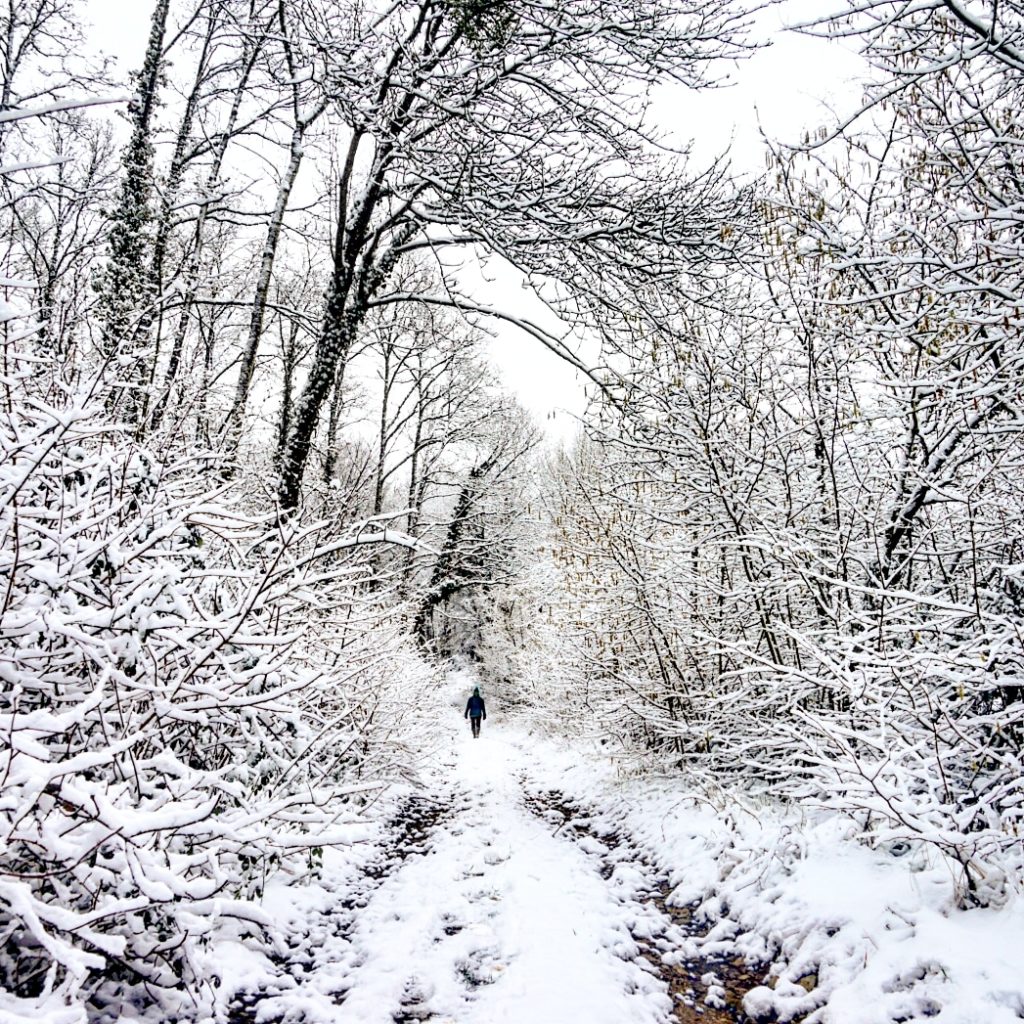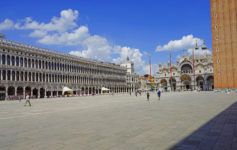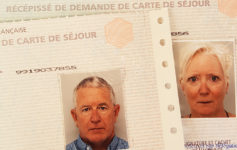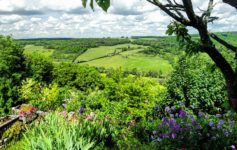
It has finally gotten cold enough that the red fox serenading us almost every night during the fall has gone silent. Or maybe we just can’t hear it anymore because the skylights in our bedroom facing the valley are closed tight for the winter.
Throughout autumn, we could hear the fox, usually around 3 a.m., somewhere in the woods on the hillside that we can see across the valley from our bedroom. When we moved in 16 months ago, we made the unusual decision to place the foot of our bed under the sloping eaves of our attic master suite, facing the big skylight. This puts the headboard smack in the middle of the room, but it allows us to sit up in bed and look out over the valley below our house to the hills beyond. And when we lie down, we can look up and see the stars.
The first night we heard the fox call, we thought it was a bird. It reminded us of the loons we sometimes heard on a lake in Ontario, Canada. But a search on YouTube turned up all the different calls of the red fox, and one of them was an exact mimic of what we were hearing.
This part of France is thick with red foxes. At night, on the very dark, winding road that climbs up to the hilltop where we live, we see them often on the roadside, their reflective eyes caught fleetingly in the brights of the car before they slink into the woods, russet hair visible in the sweep of light. One day, driving home from Dijon, we spied two of them sitting tranquilly in someone’s driveway, watching the occasional car go by.
So as we listened each night, it felt like the fox was trying to tell us something. In a different lifetime, we would have been annoyed to be awakened in the middle of the night, every night. But in this one, we would lie awake, looking at the stars, feeling the Burgundian breeze blowing across our faces, and listening to the whipper-willow cries of our fox.
As we enter our second winter in Bourgogne, things have been a lot different from the first one – at least so far. It was a long, warm, glorious summer and autumn, and only recently have the skies gone lead-gray as the days get colder and shorter. Still, unlike last year, every three or four days the sun comes out for a few hours, and that’s really all we need to keep a firm grip on reality and a positive outlook on life.
We noticed the other day when we were out walking at about 4:45 p.m. that the sun was setting. We knew this only because the clouds near the horizon parted just long enough for us to get a look at the sun before it slipped below the hills. After we spent a lifetime at the 30th parallel in New Orleans, it still takes some getting used to, now that we live at roughly the same latitude as Newfoundland.
More than a year ago, during the 24 hours or so where we pretended to be deliberative in our impetuous decision to chuck it all, sell our worldly goods and buy a house in France, our new Flavigny friend Didier suggested that we might want to spend a winter in Bourgogne first before making such an important life decision. It was excellent advice. We ignored it completely.
France made us pay for our arrogance. It started raining last winter early in November, and stopped in February, by which time we had both gone slightly insane. The only consolation was that MeteoFrance assured us it was an extraordinary winter: It rained more last winter in France than it had in any of the previous 75 winters. The more it rained, the more I whined. We could hear France laughing.
At the Quatorze Juillet celebration that the village throws every Bastille Day, I was talking to Didier about last winter, and he couldn’t resist laughing a little as well. For sure, he earned the right to say, “I told you so.”
But we have no regrets, and the truth is that we love winter. I grew up in Denver, and Paula’s from Michigan. So we’re used to winter. We’re just not fans of rainy winters. If Bourgogne had set a 75-year record for snow last winter, I think we would have been thrilled.
I used to spend at least part of every winter skiing. I love the mountains in the snow. But I’ve been in negotiations with my knees and hips over the prospect of taking up the practice again, now that we’re so close to the Alps. Because my joints now consider themselves French, they vow to strike immediately if I get within a kilometer of skis. Still, snowy places hold me in their thrall.
When I was very young, my father had a friend, a Catholic priest who was posted to Japan. I knew him only as Father Tom. One day, Father Tom called my dad and told him that he was quitting the priesthood, because he had fallen in love with a Japanese woman. He was getting married, and was going to live in Hokkaido, the northernmost island of the Japan archipelago. Every Christmas, a card would arrive, with a picture of a beautiful winter scene on the front, and a picture of Father Tom and his wife slipped inside. Usually, they were standing in snow.
I loved seeing those cards, combining as they did this exotic place and the beautiful snowfields. I was also fascinated by the notion that love could triumph over even a supposedly sacred vow to the priesthood. It fit my romantic notions (that I still hold) of love conquering all.
Years later, I watched the winter Olympics in 1972 in Sapporo, the capital of Hokkaido, and I was again struck by the stark and extraordinary beauty of a snowy winter. Sapporo, a vibrant city of 2 million, embraces winter with a vengeance, throwing a giant Snow Festival each February that features monumental snow and ice sculptures scattered across the city, while nearby in Otaru, there is a festival of lights, lining the snow-covered pathways along the banks of the town’s Venice-like canals with creative illumination. It’s all supposed to be spectacularly beautiful, in a place where the average high temperature in February is just below freezing.

That’s how you celebrate all four seasons. There’s wisdom in it.
Despite Didier’s warnings, it wasn’t the winters that scared us about moving to Flavigny; it was the isolation of living in rural France. Until last year, we spent our whole lives in cities. Before we moved to France, we might have been voted Least Likely to Live in the Countryside.
But now we are in love with the Burgundian hills; the farms and forests, valleys and streams, in all the seasons. Earlier this week, on the way to the grocery store, we were driving through the fallow fields of the Auxois, the sub-region where we live, and we passed a glorious falcon, standing proud and still on a fence post not five feet from the road’s edge. He pivoted his predatory head to watch us go by, but otherwise made no motion to leave. That was his field, and we were just passing through.
In our old life, such a sight would be a rare thing indeed. But the truth is, we’ve seen some recently plowed fields where five or six birds of prey stand in the dirt, waiting for a mouse to make a run for it across freshly harvested habitat. Things seemed pretty safe for the little critters before the thresher came by and took everything down to dirt. You almost imagine all those field mice, hunkered down in their holes, waiting for something to grow.
But they’re out of time. Winter’s almost here. For a few more weeks, the days will get shorter. We’ve already started to adjust our lives to the rhythms of the planet. Last year, we were at a loss to figure out why we were sleeping more and more each day during December and January. Then a friend in the village told us why: hibernation. Her advice was to just go with it, and eventually we did.
This fall and winter, we are getting out of bed when the Earth tells us to. Sometimes, on the cold mornings where leaving the safety of the down comforter and trudging down the ancient spiral staircase to get the fire going can seem like a burden, that can be pretty late. On cloudy days in January and February in the Auxois, it can be 10 o’clock before it even feels like the sun is up.
Last year, when we were essentially trapped inside the rain bubble by our need to stay and care for Bear, our aging Australian shepherd in his last days, I was sure that this year when the rains came, we’d head south as quick as you could say “Seasonal Affective Disorder” – to Morocco, or maybe Sicily. Air France even has non-stop flights from Paris to the French Caribbean.
But after a full summer and fall recharging under a brilliant Bourgogne sun, I told Paula, “I’ve decided this year to lean into winter.” She was not sure what to make of that.
Fast forward a few weeks, and we’re in the North Face store on Boulevard Saint-Germain in Paris’ 7th arrondissement. I had decided we weren’t properly equipped for winter travel, so I wanted to shop for the kinds of jackets you don’t actually need in the wine-growing regions of France. We really got the salesman’s attention when we mentioned that we might also want to try on the snow boots. Suddenly, we were getting the kind of treatment that I assume people who live in the chic 7th expect as a matter of course.
We left an hour later, lugging two pairs of snow boots, and two North Face “McMurdo” coats. I’ll spare you the detailed specs on the coats, other than to note that they are named after a research station in Antarctica.
“Now we’re ready to go anywhere!” I declared to my slightly skeptical (and sticker-shocked) wife.
But after all, we moved to France to see the world, and you never know where — or when — that will take you. I often spend hours dreaming about where to go next, traveling the globe by laptop, idly imagining trips we have yet to take while sitting on the couch in front of the fire. Paula sits next to me, taking breaks from her latest book to ask, “What crazy ideas are you contemplating now?”
Just wondering, I respond: What would it cost to fly from Charles de Gaulle to Cape Town? Or Buenos Aires? Or Stockholm? Or Tokyo? With Expedia and AirBnB, you can fantasy-travel the world from the comfort of your living room, with a level of specificity impossible before the internet age. (Hey, look at this apartment!)
Still, despite the dreamy nature of these explorations, Paula knows me well enough to be concerned.
The other night, I was laptop-traveling, and ran across a story about the Sapporo Snow Festival. The piece described a city in full embrace of the beauty of Hokkaido in winter, and the pictures were glorious. I was fascinated.
The story also mentioned that hotels in the city sell out well before Christmas. I switched to the Expedia tab to check, and sure enough, there were only a handful of hotel rooms left. Soon the city would be sold out.
Shortly after that, the SMS alert on our American cell phone dinged, and Paula picked it up. After a few seconds, phone in hand, she turned to me and said in her scary-soft voice: “What did you just do?”
That was when I learned that my Expedia account texts me whenever I make a reservation – like the non-refundable one we now have for two nights in Sapporo in February during the heart of the Snow Festival. It’s time to look at airfares to Japan.
I wasn’t sure how to explain myself — what’s Japanese for “Oops”? And then it came to me:
“Babe, I’m just leaning in.”




The best one yet. And I love the reference to Paula’s scary-soft voice.
Thanks. It is indeed scary.
“EXTRAORDINARY,” she then said in a sultry voice that was once soft and scary. I see this in your future. Love and Peace to you both.
Thank you so much for sharing a peek into your adventures. Your writing is like a delicious treat, something to be anticipated, then savored.
Thanks for your kind words, and for following along!
Was lovely to meet you yesterday outside of L’Abbaye. Flavigny is definitely a treat to see and experience and we can understand the attraction!
Danielle & Richard
British Columbians